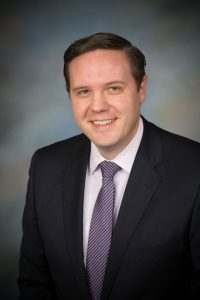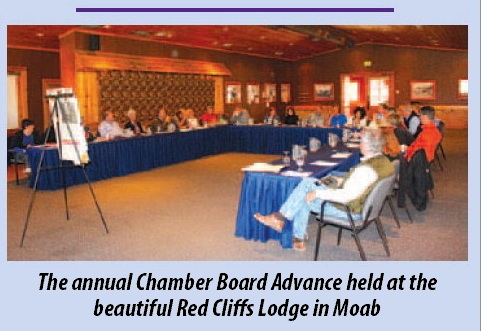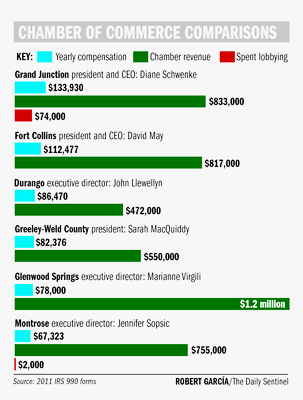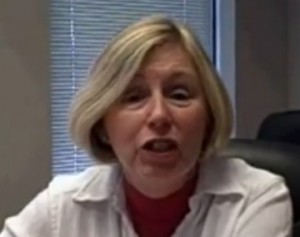“There are so many layers of stupid here, I hardly know where to begin.”
–Business owner, commenting on the actions of the Grand Junction Area Chamber of Commerce
The Grand Junction Chamber is not just tone deaf, out of touch and shows time and again that it doesn’t care about Colorado families, but in addition to this, the Grand Junction chamber often blatantly subverts its own stated mission of advocating for local businesses.
Despite its “buy local” rhetoric, time and again the Grand Junction Chamber takes its own business out of town.
Following is a list of examples of why citizens take exception to the GJ chamber, and the list is always growing:
Opposing public health, safety and welfare

Jeffrey Hurd, Chamber Board Chair in 2017, when it opposed measures to protect the health, safety and welfare of Colorado citizens and the environment in a case appealed to the state Supreme Court.
The Grand Junction Area Chamber of Commerce demonstrated it doesn’t care about protecting Colorado residents’ safety when it comes to oil and gas operations, when in spring of 2017 it officially sided with oil and gas companies in an ongoing court case filed by Colorado children who claim their health, safety and the environment are threatened by overly permissive drilling and fracking activity.
On March 23, 2017, a majority of justices on Colorado’s Court of Appeals ruled (pdf) in favor of the children plaintiffs, saying that the Colorado Oil and Gas Commission must act to protect public health, safety and welfare when considering oil and gas development.
But the Grand Junction Chamber opposed those legal protections by officially backing Colorado Attorney General Cynthia Coffman’s request that Colorado’s Supreme Court reverse the Appeals Court’s decision.
The urgent need to protect Colorado residents from the dangers of oil and gas development was driven home in April, 2017 when a home in Firestone, Colorado unexpectedly exploded into flames, killing two people inside. Investigators traced the cause to a severed gas line buried near the home that filled the home with odorless, colorless and highly explosive methane gas.
The explosion and subsequent deaths was just one way Colorado residents are threatened by unfettered oil and gas development.
Governor Hickenlooper asked A.G.Coffman not to appeal the ruling, citing a need to protect Colorado citizens and the environment from drilling hazards. But Coffman filed the appeal anyway, backed by none other than the Grand Junction Area Chamber. The chamber wrote to Gov. Hickenlooper backing Coffman’s appeal.
The GJ Chamber has consistently sided with oil and gas companies over the safety and health of Colorado residents, and over environmental damage.
This is yet another reason why the G.J. Chamber poses a danger to Colorado residents.
Opposing Higher Wages for workers
In 2016, the chamber opposed Amendment 70, to raise Colorado’s minimum wage to $12/hour by 2020, even though Grand Junction has the among lowest wages in the state. To bolster their argument against the measure, the chamber hired an out-of-state economic consultant named Eric Fruits, who works out of his house and is an Uber driver on the side, to produce a figure of 90,000 jobs that would supposedly be lost if the amendment passed. The chamber’s public rhetoric on this measure ignored over 600 distinguished economists, including seven Nobel prize winners, who had written a letter to President Obama in 2014 urging the federal minimum wage be raised as a way to boost the economy.
FAKE “BUY LOCAL” PROGRAMS
In June, 2014, the chamber debuted its new “Save Local Now” website and mobile app, but as quickly as the “buy local” effort was revealed, the Daily Sentinel reported that the chamber had hired an out-of-state web developer to create the web page and app. Dan Ryan, owner of the Grand Junction-based web marketing firm Ryan/Sawyer Marketing, said “This town has a lot of very capable web developers in it … I don’t recall receiving any RFPs on that, but surely it’s ironic that’s being developed by an out-of-town company.”
Perhaps the root of the problem is the chamber’s mistaken definition of what constitutes a “local” business. It includes in that definition big, national corporations and big box stores that have their headquarters in other states. Incredibly, the G.J. Chamber’s “Buy Local” program actually encourages consumers to shop at big box stores like Wal-Mart and K-Mart, that funnel money out of the area.
The economic effects of shopping at big-box retail outlets instead of locally-owned stores is described in Bloomberg research, which says “for every $100 spent at a locally owned store, $45 remains in the local economy, compared with about $13 per $100 at a big box.” The owner of a locally-owned yarn shop said, “My opinion of the [G.J.] Chamber is they are not pro-small, locally-owned business in this community. The Shop Local program is a good example of that.”
Solid Examples of the Chamber ignoring its own “Buy Local” advice:
When the Chamber decided to purchase gift baskets for one of their events, they patronized Hobby Lobby, a big box store, instead of a locally-owned store a few blocks from them, Woven Designs, that specializes in creating gift baskets. Woven Designs has since gone out of business.
* Hiring Out-Of-Town Lawyers
In 2012, the Grand Junction Chamber of Commerce formed a 501-c-4 “social welfare” organization to launder dark money from local businesses to influence local elections. The chamber used a Denver law firm, Holland and Hart, to incorporate the organization, instead of a local firm.
When Chamber President Diane Schwenke tried to intimidate the operators of this website, she hired a Denver law firm to send a threatening letter to the operator of the site instead of a Grand Junction law firm.
* Holding Board Meetings at Out-of-STATE RESORTS, instead of Mesa County resorts
In the November 25, 2013 issue of the Daily Sentinel, the chamber’s regular Monday full-page ad boasted that the chamber had held its 2013 “annual Chamber Board Advance” meeting at the “beautiful Red Cliffs Lodge in Moab,” Utah — a resort that isn’t just out of town, but clear out of the state. Moab is a 110 mile drive from Grand Junction. Many lovely Mesa County resorts and lodges — had the chamber seen fit to hold their meeting at one — would have deeply appreciated the business. Making matters even worse, the chamber put a photo of the their out-of-state board meeting in Moab, Utah ad directly below the results of the “shop local” survey the chamber had recently sent out to local small businesses.

Taken from the chamber’s November 25, 2013, half-page ad in the Daily Sentinel. (Yes, the chamber actually boasted about taking its business out of the area. This photo was positioned in the ad beneath a survey about supporting local businesses.)
FAKE “GREEN” BUSINESS PROGRAMS (“GREENWASHING” its activities)
The Chamber claims it supports a sustainable future” and “green-minded businesses” (pdf). It’s Facebook page sports photos of green leaves and solar panels and offers up articles like the “Top 10 Green Practices for Landscapers” and “Top 10 Green Practices for Auto Repair.” The chamber urges businesses to take steps to reduce air pollution, protect people’s health and conserve water.
Sounds great, right? Like the chamber cares about the environment?
Nope. In reality, the Chamber’s actions are as far from green as you can get.
The chamber uses green rhetoric while at same time opposing regulations on oil and gas drilling designed to protect critical wildlife habitat. The chamber defends hydraulic fracturing or “fracking” and supports commercial and industrial development along the Colorado River waterfront, even after all the hard work citizens have done over the decades to clean up the riverfront, which was devastated by commercial and industrial activity.
Chamber President Diane Schwenke supported a proposal to develop a new uranium mill in Paradox Valley near Naturita, saying it would bring more people to the area, who would then use Grand Junction’s medical facilities! Yes it’s true. Schwenke’s statement was incredibly thoughtless and even callous, because uranium exposure is positively linked to cancer and liver damage.
The Chamber also opposes higher air quality standards for our area, even though the winter air in Grand Junction is as bad or worse than Denver’s. In 2006, the Denver Post wrote that the haze in Grand Junction’s air “contains a brew of exhaust-pipe toxins such as formaldehyde, toluene, arsenic and manganese that, on average, are as high as — and sometimes higher than — Denver’s.” This is the case even though “the Denver metro area has 30 times more traffic than Grand Junction and 2.1 million more registered vehicles than Mesa County. Also, metro Denver has 2.6 million more people than Grand Junction.”
The Chamber also remains a cheerleader for development of economically risky and environmentally damaging oil shale and tar sands mining (pdf, at page 438) on the western slope, even though the pursuit of oil shale, an unproven industry in the U.S., previously brought a bout of economic devastation to the area that lasted well over a decade.
Giving the public the superficial impression that it cares about public health and the environment while simultaneously supporting policies that harm public health and the environment is called “greenwashing.” The Grand Junction Area Chamber is one of the worst greenwashers in the state.
Opposing New Jobs
In 2012, the Chamber urged a “No” vote on Colorado’s Amendment 64, (pdf) which legalized recreational use of marijuana. The amendment passed with 55% of the vote statewide, and created a burgeoning new renewable, non-polluting industry in Colorado through the growing, distribution and retail sales of marijuana. The new marijuana economy is also boosting associated industries like greenhouse equipment sales and service, legal and financial services, commercial warehouse construction and rental, and store front real estate, tourism, accounting, the hospitality industry, etc. After the law was voted in, the Chamber opposed the will of Colorado voters and wrote a letter to U.S. Attorney Eric Holder asking him to enforce federal laws against marijuana in Colorado in spite of the new law. Once the law was passed, the chamber supported City and County ordinances banning the retail sale of marijuana, an entirely new and potentially lucrative business pursuit that has since become a proven generator of high-paying new jobs and lucrative sources of municipal revenue in the state. Colorado’s new marijuana economy generated $1.3 billion in sales in 2016 alone. Cities across the state are realizing millions of dollars in new tax revenue from marijuana sales and pot has created an estimated 10,000 new jobs in the state, none of which will be coming to economically depressed Grand Junction, thanks in large part to the influence of the Grand Junction Chamber of Commerce.
Also, contrary to its stated concern for jobs and the environment, the Chamber supported opening 2 million acres of federal lands to oil shale leasing and development, opposing what many local businesses wanted on this issue. Owners of businesses devoted to tourism, farming and manufacturing banded together to oppose the Chamber’s stand on oil shale development because such development would put their businesses and existing jobs at risk, due to the large amounts of water such development would require. The Chamber also ignored the fact that shale development speculation had already pushed Grand Junction into economic catastrophe once. In 1982, ExxonMobil pulled the plug on its Colony Oil Shale project, leaving thousands of people in the area destitute and without jobs. History repeated itself when, despite the Chamber’s boosterism, on September 24, 2013, Shell oil, which was trying to develop oil shale in Rio Blanco County on Colorado’s western slope in 2013, announced it was pulling the plug on that project, too.
The CHAMBER was missing in action throughout THE 2013 GOVERNMENT SHUTDOWN, a major business crisis

Neither Diane Schwenke nor the Chamber advocated an end to the 2013 government shutdown, which cost area businesses greatly over a period of weeks.
October 28, 2013 — The federal government shutdown that ran from October 1 to October 16, 2013, and created a serious strain on local businesses. The closure of the Colorado National Monument caused $30,000 in losses to the park itself, and tourism and hospitality businesses, coffee bars and restaurants along the route to the Monument also saw significant drop-off in income. Local federal employees were furloughed, federal regulatory offices affecting local businesses, like wineries, were closed, and several large-scale events that were to be held on public lands were cancelled, resulting in significant economic loss to the area. Numerous news reports covered the difficulties local businesses and individuals experienced due to the shutdown.
Throughout this entire time, the Grand Junction Area Chamber of Commerce was silent on the topic of the shutdown. The Chamber issued no press releases and held no press conferences calling for an end to the shutdown. The chamber made no public statement and did not contact our area’s elected representatives to lobby them to end the shutdown. The Chamber’s “News and Events” page actually omitted any mention of the shutdown at all, and the Chamber’s October, 2013 newsletter failed to mention the shutdown as well. Chamber President Diane Schwenke made no public statements urging an end to the shutdown. The Chamber failed to advocate at all on behalf of local business during this crisis. Why? Because, just as we maintain, the chamber is first and foremost a political group and not an advocate for local businesses. The chamber’s absolute lack of advocacy to end the shutdown proved that is the case.
G.J. Chamber President Gets Out-Sized Compensation FAR beyond that of any of her peers

Chart of yearly compensation, annual revenue and money spend on lobbying by the Grand Junction Chamber and its peers in Colorado (Chart Credit: The Grand Junction, CO Daily Sentinel)
G.J. Chamber President Diane Schwenke makes more in annual compensation than any of her peers at similar Chambers in comparable cities throughout Colorado. Ms. Schwenke’s annual compensation package totals $133,930, equal to about 22% of the Chamber’s current total annual budget of $600,000. To put that in perspective, her compensation package is 4.8 times the annual per capita income in Mesa County ($27,680), and double the average annual household income in Mesa County. The next highest-paid president of a comparable Chamber in Colorado earns just $112,477 annually. The Montrose Chamber’s Executive Director, Jennifer Sopsic, earns just $67,323. (Montrose is 60 miles south of Grand Junction.)
WHopping Lobbying Expenditures Compared to its peers
The Grand Junction Area Chamber spent a total of $74,000 on lobbying in 2011. The only comparable Colorado chamber that spent anything at all on lobbying that year spent only $2,000, and that wasn’t even an election year. Presidents of other Colorado chambers of commerce told the Grand Junction Daily Sentinel that they are careful to stay out of politics, making the Grand Junction Chamber’s venture into local politics extremely unusual among similar-sized chambers.
Taking Credit for things it did not do
In a July 5, 2013 article in the Daily Sentinel about a bike race over the Colorado National Monument, Ms. Schwenke claimed the Chamber of Commerce and the county built Rim Rock Drive, the spectacular road that runs through the park. The road was actually built in the 1930s by the federal government’s Civilian Conservation Corps and Works Progress Administration:
“If you look at the history, the feds wouldn’t pay to put the road in,” Schwenke said, referring to Rim Rock Drive, the 23-mile road overlooking the monument’s steep canyon walls and ochre spires. “The county and the chamber built that road.”
— G.J Chamber President Diane Schwenke



